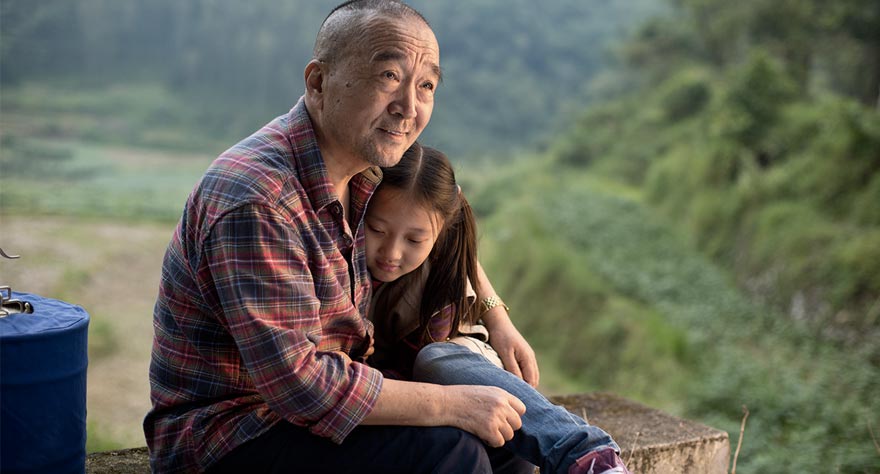
A simple and sweetly pacifying tale is undercut by bland, uninteresting craftsmanship.

A simple and sweetly pacifying tale is undercut by bland, uninteresting craftsmanship.
There’s a difference between “simple” and “simplistic” storytelling, and The Nightingale is a film that walks a fine line between the two terms. Director Philippe Muyl relies on an unfussy narrative, familiar character dynamics and placid visuals to make the sentiment of his tale resonate. The film is old-fashioned and contains a fair amount of charm, but it takes no risks (neither in the film’s aesthetic or its plot complications). Themes of reconciliation, youthful optimism and multigenerational bridge-building mosey on through, their potency limited by a lack of conflict and a penchant for easy answers.
Set in modern day China, The Nightingale finds a family suffering from disconnection. A married couple (portrayed by Xiaoran Li and Hao Qin) and their young daughter, Ren Xing (Xin Yi Yang), are living in a cold, sterile apartment in the city. The parents are preoccupied with their busy professions and the girl seems to be more endeared to the bright screen of her iPad than anything else. When a pair of important business trips send each of the parents away, the mother has no choice but to leave her daughter with her grandfather (Baotian Li). He lives a quiet life on the other side of town and has his own voyage in the works. The destination is his childhood village—a place nestled far away, deep in the Chinese countryside. A wealth of memories, both joyous and sad, await him there and whether the temperamental Ren Xing likes it or not (spoiler alert: she doesn’t), she’s coming along for the ride.
The bulk of the film follows the travels and interactions of this girl and her doting grandfather. Right away, it’s shown that he won’t get through to her easily. Ren Xing huffs about, making up complaints, willfully disobeying her grandfather and spurning any of his attempts to pick her brain. She’s clearly very independent, but her antics are unreasonable at times. Of course, the early friction transparently sets the relationship up for a tender reversal, as the more time the two spend in the countryside and amongst the smiling villagers, the more they bond and the better they understand each other. At the center of this is the titular nightingale that the grandfather carries around in a cage. Its meaning is gradually revealed and the bird eventually comes to be the film’s unifying emotional symbol.
From these descriptions, one might envision a gently affecting tale with low stakes and the potential for a hugely poignant takeaway. It is indeed gentle and the stakes are definitely low, but the execution is bland and conventional. The look of The Nightingale isn’t quite televisual, but the lighting and camerawork are so disappointingly unexpressive and flat. Even the sections in the countryside are—with all the gorgeous landscapes that are at the director’s disposal—generically “pretty” in the way the spaces are captured. Muyl is after a relaxed pace and ponderous tone here, but the imagery fails to provoke any thought.
As far as subtext goes, there’s plenty, but the motifs and messages are obvious. All throughout The Nightingale, there’s a running theme of dichotomies, the most prominent one being the unceasing movement and chaos of the city and the serene wisdom of the country. There’s something to be said about the divide between these two realms, but the film doesn’t do the topic justice, approaching it with a lack of nuance. The sprawling metropolis is repeatedly established with what appears to be slight variations of the same shot of sped-up traffic. By the third or fourth instance of this, we get idea. Meanwhile, the countryside is presented as a picture of paradise—accented by the perpetual laugh of children and shimmering, imperfect vistas.
This is where that “simplistic” sensibility comes in. The story is very straightforward and for a while, the absence of big, game-changing events is kind of nice. Baotian Li contributes a lot with his sweetly sympathetic performance and the sauntering nature of the tale is pleasant enough. But at some point, I began to hunger for something a little more substantial. Every little obstacle that comes up for the characters is very quickly dismissed or assuaged, and each beat of the characters’ individual developments falls into place, unearned. The countryside works like a magical sedative on Ren Xing’s sour mood and technological enslavement, and a previously strained relationship between the grandfather and the girl’s dad is quickly mended.
I’m assuming that The Nightingale’s target audience is children and easy-to-please families, as more cynical or discerning viewers may feel patronized by the easy sentiment and cookie-cutter storytelling. At the same time, there’s an oddly undercooked divorce subplot in the film that doesn’t fit the otherwise buoyant tone and feels out-of-place each time it’s brought up. Maybe this part is meant for adults seeking greater dramatic weight, but it isn’t thought out well enough to properly satisfy those needs, so I’m not sure what to make of it.
With all this negativity, it needs to be reinforced that The Nightingale is entirely harmless entertainment with, at the very least, a good heart and a nice message. It may be a fine choice for a casual afternoon viewing, but you probably won’t remember it the next day.